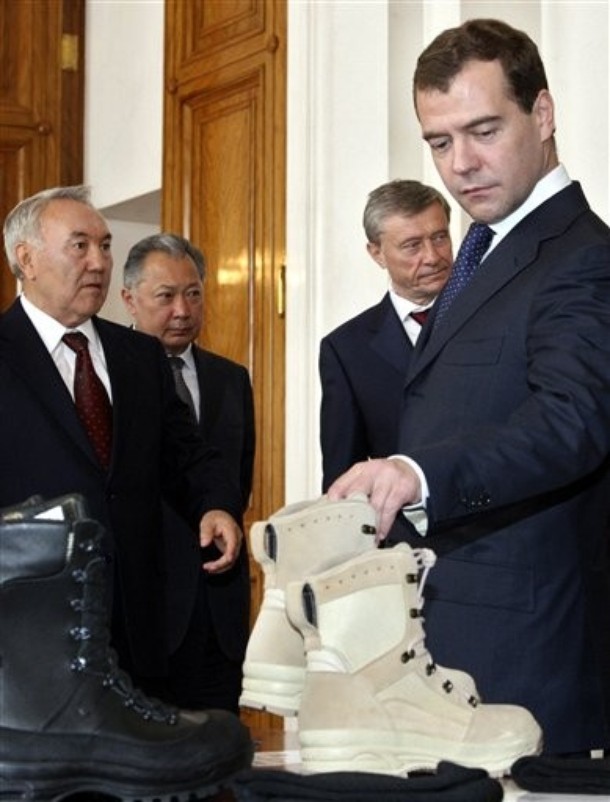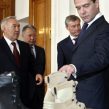
Uzbekistan Quietly Stalling on CSTO Collective forces
Publication: Eurasia Daily Monitor Volume: 6 Issue: 115
By:

Russian President Dmitry Medvedev clarified that Armenia signed without conditions, but it was Uzbekistan that registered multiple objections and reservations at the Collective Security Treaty Organization’s (CSTO) summit in Moscow on June 14 (EDM, June 15). The seven heads of state were scheduled to approve agreements on enlarging the CSTO’s collective forces, the scope of their missions, and the legal authority for their operations. But, with Belarus boycotting the event and Uzbekistan dissenting on some major counts, the summit’s documents are of questionable validity, despite their approval by Russia, Armenia, Kazakhstan, Kyrgyzstan, and Tajikistan. Policy documents can only be adopted by consensus under the CSTO’s own rules.
The summit served at least to change the concept and title of the CSTO collective forces, from "rapid response" (bystroye reagirovanie) to "operational response" (operativnoye reagirovanie)" forces. According to Medvedev, the change is not simply one of terminology but reflects a change in force planning (Interfax, March 14). It stems from Moscow’s recent ambition to create a larger group of forces including conventional warfare capabilities.
This ambition goes beyond the initial goal of fielding a small force geared to low-intensity conflicts and involving primarily counter-terrorism missions. Meetings of the CSTO Council of Heads of State (the top political decision-making authority in CSTO) in September and December 2008 and February 2009 resolved at least on paper to beef-up the rapid response forces into operational response ones. At the February summit Medvedev complained that the forces existed merely "on paper" (EDM, February 5).
At the June 14 summit, Medvedev again sounded almost scathing about the slow pace of implementation thus far: "The collective [rapid response] forces have never done anything, they never assembled, not even for exercises." He urged that joint exercises be held as a matter of priority (Interfax, June 14).
The rapid response forces continue to exist for the time being, pending their enlargement into operational response forces. The existing force consists of 10 battalions in Central Asia (five Russian ones stationed in Tajikistan, two Kazakh and Tajik, and one Kyrgyz battalion) plus the Russian air base at Kant in Kyrgyzstan (nominally a CSTO base) with an estimated grand total of 7,000 troops. Uzbekistan does not contribute troops to this collective force.
The operational response forces, however, are ambitiously planned to include up to 20,000 troops, including armor and artillery units and adding Russia’s Caspian Flotilla. The collective forces would incorporate Spetsnaz-type, interior ministry, security service, and emergency-situation units. A Russian airborne division and air assault brigade (based in the Moscow region and in Ulyanovsk, respectively) are earmarked to form the core of the collective forces. The collective doctrine, armaments, uniforms and kit are to be standardized along Russian lines.
Uzbek President Islam Karimov chose low-profile tactics to resist Russian proposals at the Moscow summit. Karimov did not attempt to emulate Belarus President Alyaksandr Lukashenka’s vocal opposition and boycott tactics. In the concluding press briefing, Karimov kept quiet while Medvedev merely alluded to Uzbekistan’s objections and reservations. These, however, can be gauged from the Uzbek position at the February 4 CSTO summit and the June 3 Moscow sitting of the CSTO Council of Defense Ministers, which ended inconclusively thanks mainly to Uzbekistan’s stalling.
Six Uzbek "special positions" can be discerned between the lines of official statements and in off-the-record official remarks. Tashkent wants:
a) Uzbekistan to decide on its own whether to participate in CSTO military operations and other activities, on a case-by-case basis
b) Collective forces’ entry on the territory of a member country to be authorized only if the move does not contradict that country’s constitution and legislation
c) CSTO decisions on force deployment in any theater to be made by consensus, not by a majority of the member countries’ votes
d) Collective forces are not to be deployed in conflict situations occurring between CSTO member countries
e) The agreement on creating collective forces to require parliamentary ratification by all member countries, and only then to take legal effect
f) Tashkent also registers objections, not specified publicly, to Moscow-proposed command arrangements for the collective forces (EDM, February 5, 6, June 4; Interfax, June 3, 4, 14).
Such objections and reservations are designed to: stay out of such conflict situations as do not affect Uzbekistan’s interests; safeguard against unwanted entry of Russian-led CSTO forces in Uzbekistan; avoid being outvoted on Moscow-initiated force deployment decisions in the CSTO; ensure that Russian-led CSTO forces do not intervene in conflict situations between Uzbekistan and any of its neighbors; maintain national command to the maximum possible extent over Uzbek troops in collective operations; and slow down the political-legal process by requiring parliamentary ratification in advance, whereas Moscow wants the agreement on the collective forces to take legal effect before it is ratified by national parliaments.




